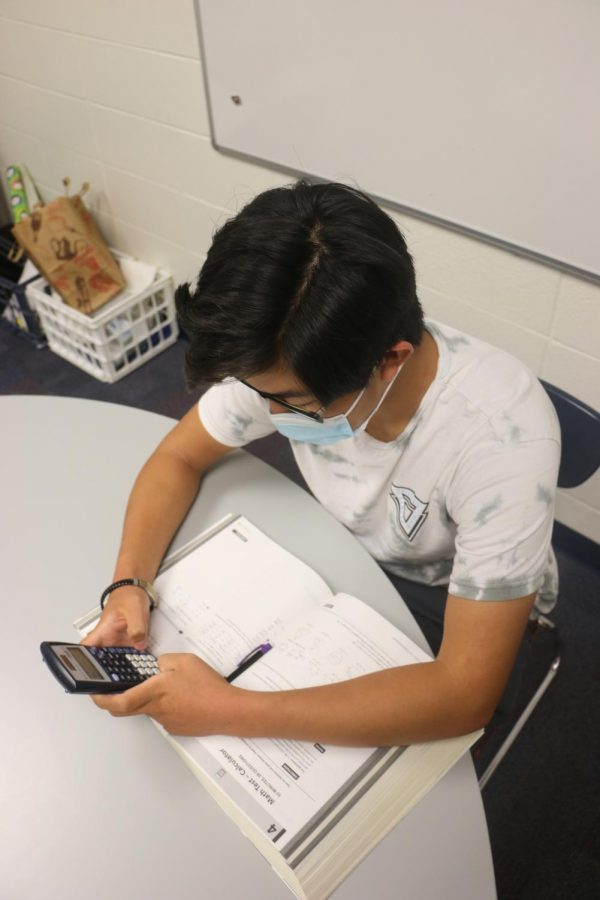As of this school year, new graduation requirements are being put in place affecting the class of 2023 and later graduating classes. These changes say that the previously required ISTEP program will be replaced with the need to take either the SAT, ACT, or ASVAB test and score at minimum a state-determined score that has yet to be decided, or complete a transition to career pathway course within their school.
Assistant Principal Valerie Piehl said there will be an SAT day scheduled at the school, tentatively during March, and after this year, the school will no longer give ISTEP tests.
Junior Elliott Shi said he thinks the new requirements make more sense practically. “Generally, colleges look at scores for SAT & ACT, but don’t really look at standardized state scores,” he said via email. “It would make more sense to require SAT, ACT, etc. to prepare students.”
Senior Kindle Hohlt said she has taken both the ASVAB and SAT tests and despite believing she is not a good test taker, she said she agrees the change is a good idea. “It would help the students have the opportunity to finish it at school and not have to worry about it after,” she said via email.
Piehl said students with learning disabilities or test-taking accommodations will still be available during the school’s upcoming SAT day, but they will operate differently than during past standardized testing days.
“For the SAT, students with disabilities have to have their accommodations approved through the College Board, not just through the school,” Piehl said. “If a student has an individualized education plan, they need to make sure they reach out to their counselor and make sure they apply for those accommodations.”
Hohlt said she would advise students to put their best effort into the assessments so they wouldn’t have to worry about test scores later on. Unlike ISTEP, standardized SATs and ACTs can be retaken in out-of school testing days as well.
Piehl also said she suggested students look into the differences between the SAT and ACT tests, and speak to their counselors about what would work best for their personalized future plans.
“Overall, this is a positive change that (administration) sees as giving students more ways and more opportunities to meet graduation requirements,” Piehl said. “It’s no longer a one-size fits all test that is pass-fail and that’s it. I think it’s not as easy to explain, because there are so many different options, but I think it’s a positive because we have different students with different long-term plans and we now have more ways to meet the needs of all our students.”
















































































![Review: “The Immortal Soul Salvage Yard:” A criminally underrated poetry collection [MUSE]](https://hilite.org/wp-content/uploads/2025/03/71cju6TvqmL._AC_UF10001000_QL80_.jpg)
![Review: "Dog Man" is Unapologetically Chaotic [MUSE]](https://hilite.org/wp-content/uploads/2025/03/dogman-1200x700.jpg)
![Review: "Ne Zha 2": The WeChat family reunion I didn’t know I needed [MUSE]](https://hilite.org/wp-content/uploads/2025/03/unnamed-4.png)
![Review in Print: Maripaz Villar brings a delightfully unique style to the world of WEBTOON [MUSE]](https://hilite.org/wp-content/uploads/2023/12/maripazcover-1200x960.jpg)
![Review: “The Sword of Kaigen” is a masterpiece [MUSE]](https://hilite.org/wp-content/uploads/2023/11/Screenshot-2023-11-26-201051.png)
![Review: Gateron Oil Kings, great linear switches, okay price [MUSE]](https://hilite.org/wp-content/uploads/2023/11/Screenshot-2023-11-26-200553.png)
![Review: “A Haunting in Venice” is a significant improvement from other Agatha Christie adaptations [MUSE]](https://hilite.org/wp-content/uploads/2023/11/e7ee2938a6d422669771bce6d8088521.jpg)
![Review: A Thanksgiving story from elementary school, still just as interesting [MUSE]](https://hilite.org/wp-content/uploads/2023/11/Screenshot-2023-11-26-195514-987x1200.png)
![Review: "When I Fly Towards You", cute, uplifting youth drama [MUSE]](https://hilite.org/wp-content/uploads/2023/09/When-I-Fly-Towards-You-Chinese-drama.png)
![Postcards from Muse: Hawaii Travel Diary [MUSE]](https://hilite.org/wp-content/uploads/2023/09/My-project-1-1200x1200.jpg)
![Review: "Ladybug & Cat Noir: The Movie," departure from original show [MUSE]](https://hilite.org/wp-content/uploads/2023/09/Ladybug__Cat_Noir_-_The_Movie_poster.jpg)
![Review in Print: "Hidden Love" is the cute, uplifting drama everyone needs [MUSE]](https://hilite.org/wp-content/uploads/2023/09/hiddenlovecover-e1693597208225-1030x1200.png)
![Review in Print: "Heartstopper" is the heartwarming queer romance we all need [MUSE]](https://hilite.org/wp-content/uploads/2023/08/museheartstoppercover-1200x654.png)




